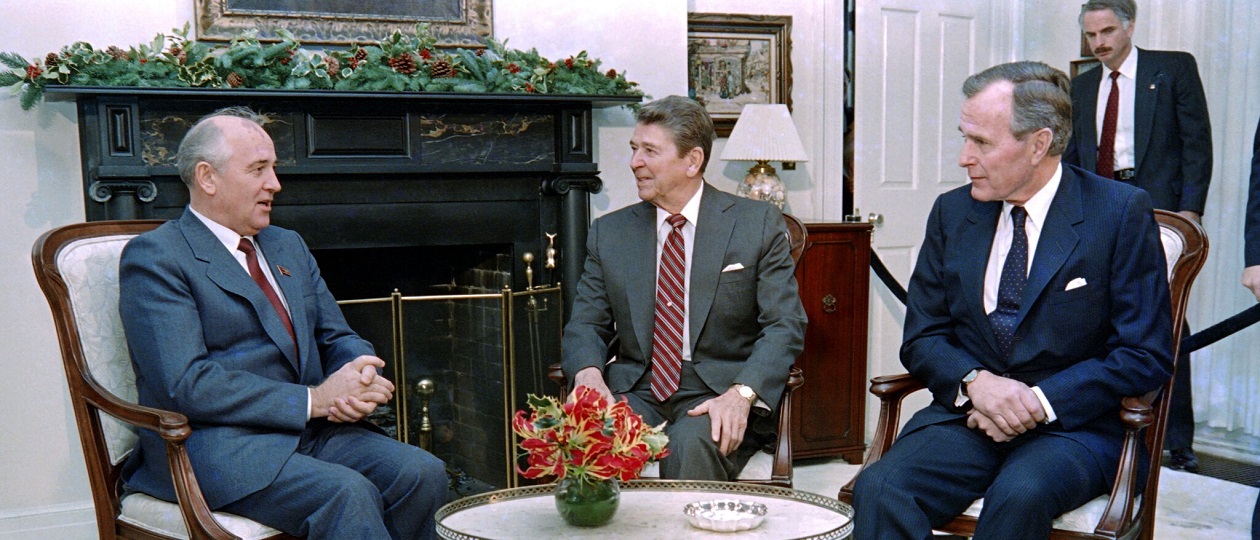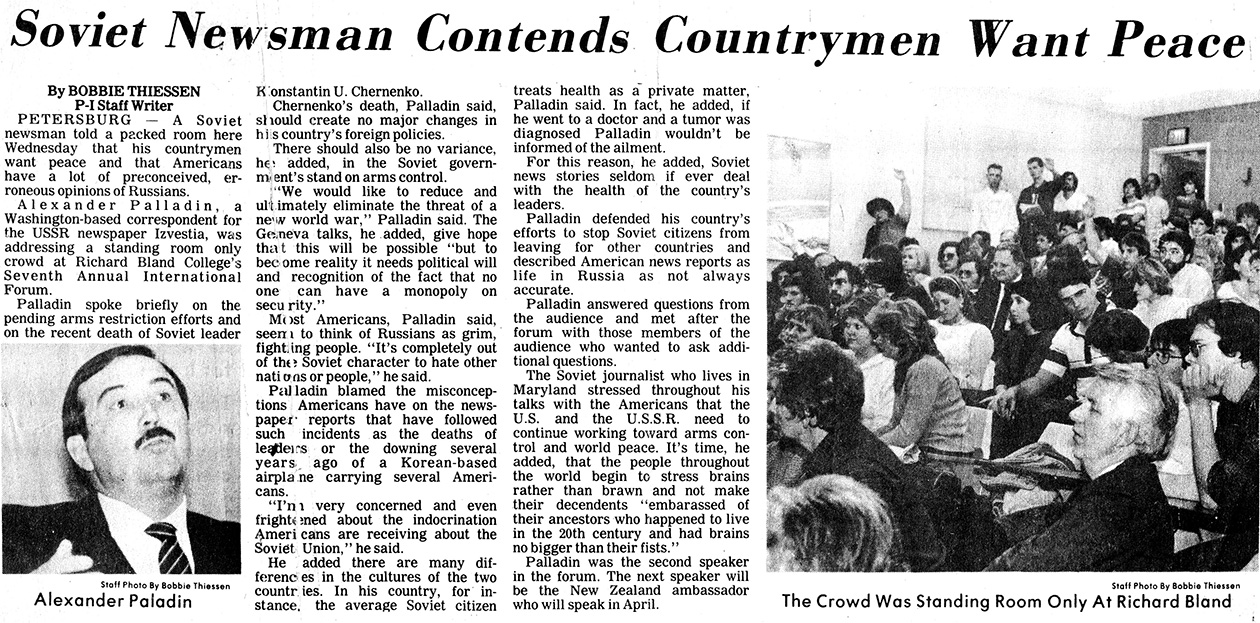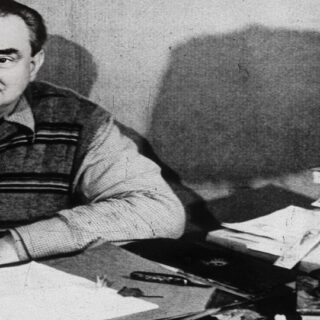
My speech at Richard Bland College, Petersburg, Va. March 20, 1985.
“Mr. Chairman, esteemed hosts, ladies and gentlemen!
As little as I might know about your country and your mores, I do know that a person in my present position is expected to start with а joke. I feel being under special pressure of this kind, for in this part of the world we, Russians, happen to be described as sinister, gloomy types who are only now learning how to smile and just because our new national leader seems to be a jolly fellow.
To disprove this misconception I could display various styles of humor. I could start with a joke, appropriate for the historic moment we happen to live in, and could say, borrowing from black humorists, that we all should rejoice still being alive.
Or, in the manner of Mark Twain, whose books have never been banned in my country and are beloved by millions of my countrypeople, I could remark that rumors about the Soviet Union’s demise are premature. Still, my own preference is to relate a not so fun¬ny, but symbolic story which elderly people in the Caucasus tell their off-springs to share their hard-won wisdom.
The action is set in the pre-delugian times, when the utmost title of the cleverest being belonged to our ancestors, the chimpanzees. (No offense is meant to those who believe in other theori¬es of homo sapiens’ creation). So, as this story goes, at that Age of Darkness and total illiteracy the world was ruled by brawn instead of brain. The stronger did not believe in justice and consumed the weaker and meeker at their will.
Soon, only the fittest survived, and to continue the same diet they started to hunt for each other. Thus, the idea was born that strong paws and teeth should be matched by equally strong body-shields. As kevlar was not yet dreamed of, and flak vests were a thing of a distant future, the beasts began growing their own protection which later would be copied by designers of tanks. In this endeavor one particular animal, akin to dinosaurs and possessing an especially gigantic might and size, managed to outclass the rest of the crowd. One morning it went on its daily eating spree and found no other species to feed on, for all of them had already been killed.
Not to worry, the only survivor said to itself, I can switch to vegetarianism. On¬ly problem was, to get some fruits, vegetables or grass, the beast had to cross a river. Being fearless and quick on action, it plunged into the water without a thought. Alas, the panzer which had saved it from all the attacks, now locked its fate. The strongest paws and tail under the sun were unable to keep the enormous weight afloat, and in a matter of seconds the conqueror of the pre-historic world was no more…
The morale of this fable is self-evident. Telling it to their children and grandchildren, our elders would add with a wink that an autopsy performed on the ill-fated beast revealed that it had a brain the size of a baby’s fist.
I hope that you would agree that we still live in an imperfect world, where many actions of human beings are not on a par or even contradict our most advanced ideas, if not natural interests. It’s a sad fact, that we still tend to develop brawn before brain, for the most daring and innovative discoveries are forever used to build and upgrade means of destruction.
As soon as we learnt how to split the atom, this knowledge was used in a war. And now the poetic dream of Old Romans, per aspera ad astra — through difficulties towards stars, is supplanted by the militaristic prose of the Star Wars plans.
I don’t need to remind you that long gone is the time when those who inhabited the fortress America, separated from the rest of the world by oceans, could feel as almost living on another planet. Being part of Europe, part of Asia, we, Russians, have quite a different history, in many ways unparalleled.
But we wouldn’t wish even our enemies to relive the horrible invasions, destructions of thousands of cities and towns, and killings of millions of our people, that have been inflicted upon us century after century. This tragic experience has not only made us proud of our ability to defend our homeland, but also has enabled us to understand, hate and reject the notion of war as a natural and inevitable form of human activities.
For the first time in our long history my nation has had a forty-years span of not a single aggression committed against our land, and the will to make it endless is the most powerful political and spiritual vehicle that drives the Soviet Union now.
So, when in early May we, as all good people on Earth, celebrate the 40th anniversay of the end of the bloodiest war in human memory, our feelings will be mixed. We will cry over 20 million Soviet citizens, and millions of others, who died to defend us all from fascism. At the same time, we will rejoice over the fact that peace, however unstable and fragile, has prevailed on the continent where the two world wars were unleashed.
For us it will also be a time to reconfirm our devotion to the idea of peaceful coexistence, which, I am sure, is shared by many Americans, even if they call it differently: live and let others live.
I know that you have followed with keen interest the latest developments in the USSR. To me, that was more than sheer curiosity on your behalf. Rather, it was a manifestation of your understanding that, whether you like it or not, our two countries des¬tinies are intertwined. Still, I have to confess my astonishment at the naivete, to put it mildly, of the bulk of comments on this subject, provided to you by those who claim to be Kremlinologists.
I can’t help feeling amazed that so much talent, efforts, resources and money are wasted to misinform you, rather than enlighten, on real life and developments in the USSR.
Examples of that are aplenty. The most striking, in the context of what’s happening now in Moscow, are speculations whether the election of Mikhail Gorbachev as our new national leader hints at drastic changes in the Soviet policy.
None of such fantasies is, or, for that matter, COULD ВE even remotely true. Anybody with at least a basic knowledge of our system would understand that whatever changes in the Soviet Union happen аrе a natural response to the needs of a society on the move.
We do have problems, derived from the fact that the USSR of the 80s is not quite the same as it used to be in the past. These problems are a matter of constant concern and study for our party, government and the people, and they are being answered by introducing necessary reforms.
As far as our foreign policy is concerned, none of the three party leaders of the past three years has given any reason to think that we are about to drop the basic approach to our relations with the outer world, as it was formulated by the founding father of the USSR, Vladimir Lenin, 67 years ago. We were, are and will be for peaceful coexistence, mutually beneficial exchanges in trade, science, culture and other similar areas of human activities with every single nation that is willing to do that. But, most of all, we would like to reduce and ultimately eliminate the threat of a new world war, which, as we think, is a public enemy № 1 of everybody, be it Russian, American, Catholic, Muslim or atheist.
In fact, we feel very proud of our unmatched devotion to the principles of coexistence of nations, to which everybody can agree without feeling discriminated or endangered. In this, as well as in some other respects, our foreign policy is unique, for it doesn’t depend on personal whims of new leaders who every now and then come into office and try to put things upside down, as if the universe were spinning around one geographical point of the Earth.
Nevertheless, such continuity does not preclude continuous innovations and flexibility, which is another characteristic of the foreign policy of the USSR. Again, examples abound of the good¬will and thoughtful approach, displayed by our leaders whenever we confront a major world problem.
The Soviet Union has a record, second to none, of introducing and unilaterally carrying out initiatives in the field of arms control and reduction. We made a pledge, still waiting for a reply by the West, never to use nuclear arms against those who abstain from using them against us. And, not to repeat all the other one hundred plus similar initiatives, let me remind you that we introduced a unilateral moratorium on testing weapons in space.
Wе think that humanity has already had abundant examples of so-called revolutionary innovations in arms modernization which, far from being defensive, only increased the threat of a nuclear winter which even the Pentagon says would be the result of a nuclear exchange. Living in a society with no one to profit from the arms race, we look upon ever-increasing arsenals of death as inmoral, for they deprive us, as well as other nations, of a chance to build a happier and better environment.
Is there hope, then, that with the recent developments, namely the beginning of Geneva talks, the world will become a safer place to live in? To this I, personally, have a bifold answer. Yes — in the sense that such a hope indeed exists. To become a reality, it needs a political will and recognition of the fact that nobody can now have a monopoly over security, and demand that the other guys forego their own.
Unfortunately, little, if any, of such an approach has been displayed so far by our counterparts in Geneva. Nice smiles and handshakes for the sake of front-page photos cannot fill the vacuum or real desire to deal constructively with the arms race. Neither do we need any lectures on the pros of the Star Wars initiative, whereas even in your own country knowledgeable people realize that it has many more cons.
We still wait for at least one indication that the other side views the talks in Geneva as something more than a bargaining chip to extract even more funds from the Congress to build ever more and newer weapons of first-strike capacity. We don’t buy the logic of escalating the arms race, and provoking its expansion into outer space.
And when we insist that the genie of the star wars should be rebottled, it’s not for fear of being outclassed by a superior American technology. The nation that managed to launch the first sputnik and to put the first cosmonaut into orbit, to say nothing of other records in space exploration, would surely be able to take up the challenge, if this is the choice of the other side. But, again, if we do this, it will be against our will and best interests, to the detriment or the well-being and security of the whole human race.
Obviously, there is another, much wiser way to protect the USA, USSR and any other nation from an aggression — through a reduction and final elimination of weapons which my Government has proposed more than once.
The great Spanish painter Francisco Goya once made a series of paintings which he called “Sleepy Mind Creates Monsters“. This metaphor is still valid today. Obviously, it is much easier to hate another person, even whole nations, if you keep your preconceptions about them intact by avoiding any contact, by ascribing to them what your suspicions and worst fears dictate, by whipping up a paranoia about their supposed intentions and actions. That is why I would like to conclude my remarks by sincerely thanking and congratulating my hosts for an effort to better understand what real, not imaginary, Soviet people think and strive for.
I wouldn’t like you to interpret my remarks as confrontational. In fact, I tried to use as much of a diplomatic language as possible to describe what we see as a very dangerous trend in Soviet-American relations. Whether you agree with me or not on my presentation, I want to very honestly say that it is completely out of Soviet character to hate other peoples and nations, whatever their system or government is. We believe in the ultimate triumph of goodwill and human intellect and extend our hand to everybody.
So, let’s be more willing to see the good side in each other and not make our distant off-springs embarrassed by their ancestors who happened to live in the 20th century and seemed to have fists bigger than brains.”






